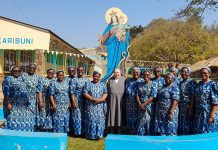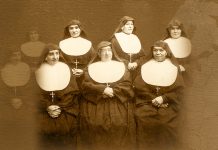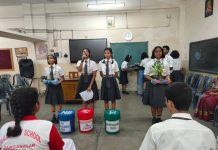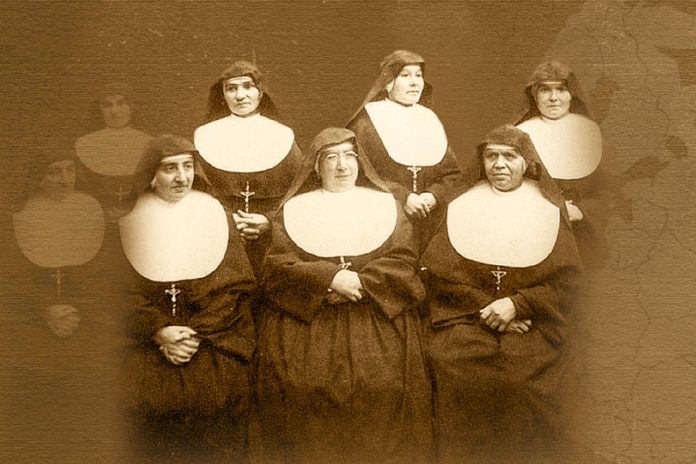Rome (Italy). August 30, 2024 marks the 83rd anniversary of the death of Sister Laura Meozzi (1872 – 1951), at Pogrzebień, pioneer of the presence of the Daughters of Mary Help of Christians in Poland, declared Venerable by Benedict XVI on 27 June 2011.
At the beginning of the decree, we read a sentence that sums up the meaning of her life, “Soul and body fixed on the cross of Jesus, to be constantly consumed. Climb, always ascend along the road paved with crosses; never back down and put a smile on your lips… Transform yourself into Jesus with love and suffering.”
When, after the General Chapter of 1922, the Superior General, Mother Catherine Daghero, entrusted her with the mission of going to Poland. Thus, Sister Laura fulfilled a desire she had had at the dawn of her vocation. With two Italian and three Polish Sisters, she faced difficulties of all kinds to open the first house in Rożanystok. In 1929; the Novitiate was opened there. In 1931, the Preprovince of Poland was founded in Wilno, bringing together 35 FMA, 25 novices, and 5 houses. In 1934, the seat of the Preprovince was transferred to Laurów, in a house that welcomed 150 orphans, with a nursery school, elementary school, and initial literacy courses.
On 1 September 1939, German troops invaded Poland; Great Britain and France declared war on Germany. This was the beginning of the Second World War. The Preprovince of Poland had 101 FMA in 9 houses, but the war did not spare them. The Sisters had to leave Laurów and, since there was a lack of manpower, those “fit for emergency services” were obliged to report to the war office for forced labor. Some were assigned to the kitchens and placed in factories in Wilno. Others were sent to other jobs. For the weakest, Mother Laura managed to obtain placement in service with some family. She and some other “unfit” people with a medical certificate were assigned to Krynica, a small house in the woods near the Wilia, under house arrest. The Sisters from the Wilno house were hired here and there either by the Salesians as cooks or washerwomen, or by others.
The house in Rożanystok was also evacuated, the Sisters dispersed, the Novices with their relatives, as had already happened in Laurów for the Postulants. On 7 September 1939, two young Sisters died as victims of the bombing of the Minsk Mazowieki station, while trying to reach Warsaw to find food and aid for the children of the orphanage in Laurow, which had remained isolated.
In 1940, Fascist Italy also entered the war alongside Nazi Germany. Italians living in Poland automatically became “enemies”. Before leaving the country, the Italian consul invited Mother Laura and the other Italian Sisters to leave. The response was firm, “Thank you, Mr. Consul, Sister Barocco Francesca and Sister Broggini Cleofe will come. I will not leave these Sisters for any reason.” And the consul, “But do you know what tomorrow may bring?” “God will help us. We are in His hands.” The consul did not give up and called her again on the phone, but received the same response.
Amidst a thousand difficulties and privations, Mother Laura continues her maternal mission in the “house in the woods”. Dressed as a peasant, she spends her time praying, taking care of the kitchen, writing letters, and listening to the Sisters who reach her on foot from the places where they are. She is a woman of peace and there are numerous testimonies that document this. Her presence and that of the FMA becomes a presence of reconciliation, beyond any human calculation.
Laurów’s new ‘master’, a Lithuanian officer, one day asks her to send a Sister to assist his seriously ill daughter. Mother Laura calls Sister Maria Pytel, “Do me a favor; go and take care of that poor little girl.” “With all they’ve done?”, the Sister replies. “Maria, if they throw stones at us, we give them bread… Go!” And after Sister Maria’s assistance, the little girl slowly recovers.
Prayer sustains her. The testimonies of these painful years confirm that she spends many hours in the chapel. The Director of the Laurów Boarding School recalls, “I found her leaning on the altar table in conversation with the Eucharistic Jesus and she didn’t even hear that I had entered… she didn’t hear the door creaking”.
Sister Jadwiga Kondratowicz recalls that during the war Mother Laura, “never got impatient. The Germans came, the partisans came, the Russians came. Everyone demanded this or that: bread, potatoes, flour, money, blankets, etc. Everyone with their rifles pointed. We ran to her and she would tell us, ‘Do this or that, say this or that, give, don’t give’… Then she would add: ‘I will pray; don’t be afraid’!”.
These memories are echoed by some sentences from the Letters:
“If we do not care about souls and do not work for their salvation, we will never be Daughters of Mary Help of Christians. Courage then, each one in her own way, work, some with words, some with assistance, some in the workroom, some in the kitchen, some going around and helping; do what you can to save souls, to help them to become good, to love Mary.” (Letter 199 to the FMA – Rożanystok 1930)
“Unfortunately, there is no lack of suffering and annoyance, but these are the fragrant flowers that blessed Jesus offers us and that we must be happy to pick every day… Holy cheerfulness, delicacy of manner, an eternal smile on the lips, delicate answers, and thinking well of everyone. This is the work that we must constantly do to become saints in the manner of Don Bosco and … love towards everyone, especially towards the girls.” (Letter 200 to the FMA – Rożanystok 1930)
“Always calm, always serene even in the most critical circumstances, even when our patience is put to the test.” (Letter 205 – 1934, Feast of St. Francis de Sales)
“The adversities and annoyances of life are steps to reach Heaven, where we will be happy. […] Always forward, my dear Sisters, always forward on the path of faith, virtue, love, sacrifice, charity. Yes, charity towards all, let it be our daily bread, and always also towards the girls and children, whom you must love, help as much as you can, as much as the Rule allows us… Let them approach the sacraments as much as you can, but do not force them; they must be free and go for love. Do good as much as you know and can and, not having the means to approach these young people, pray a lot.” (Letter 217)
“Take courage in the annoyances, in the inevitable sufferings of life; think that everything passes and that we are left only with the merit of the good works done for the love of God. […] Love the girls very much and do for them everything you can and know, without expecting any reward; the reward for our efforts is an increase of the love of God in us.” (Letter 220)
“You consoled me with your news because you know how to face the difficulties of every day and your soul enjoys the peace of the Lord. This is necessary for every soul because the Lord is in peace and His action in the soul always brings peace.” (Letter 178 to an FMA – Pogrzebień 1951)
In these times of “piecemeal world warfare” (cf. Pope Francis), Mother Laura Meozzi teaches and supports the courage to always believe in and work for peace.




















